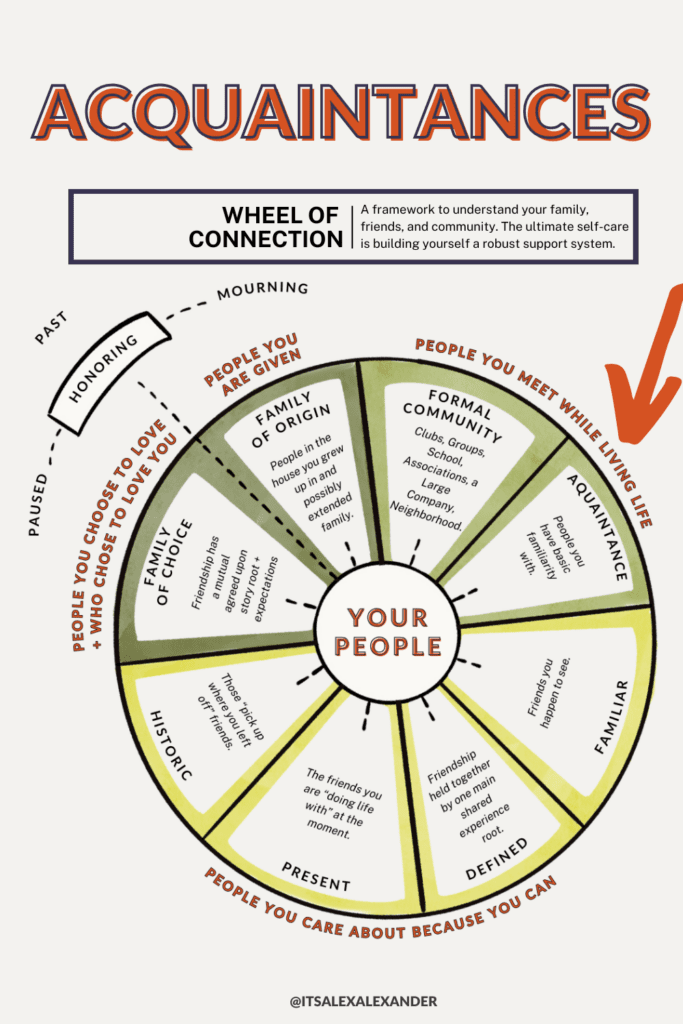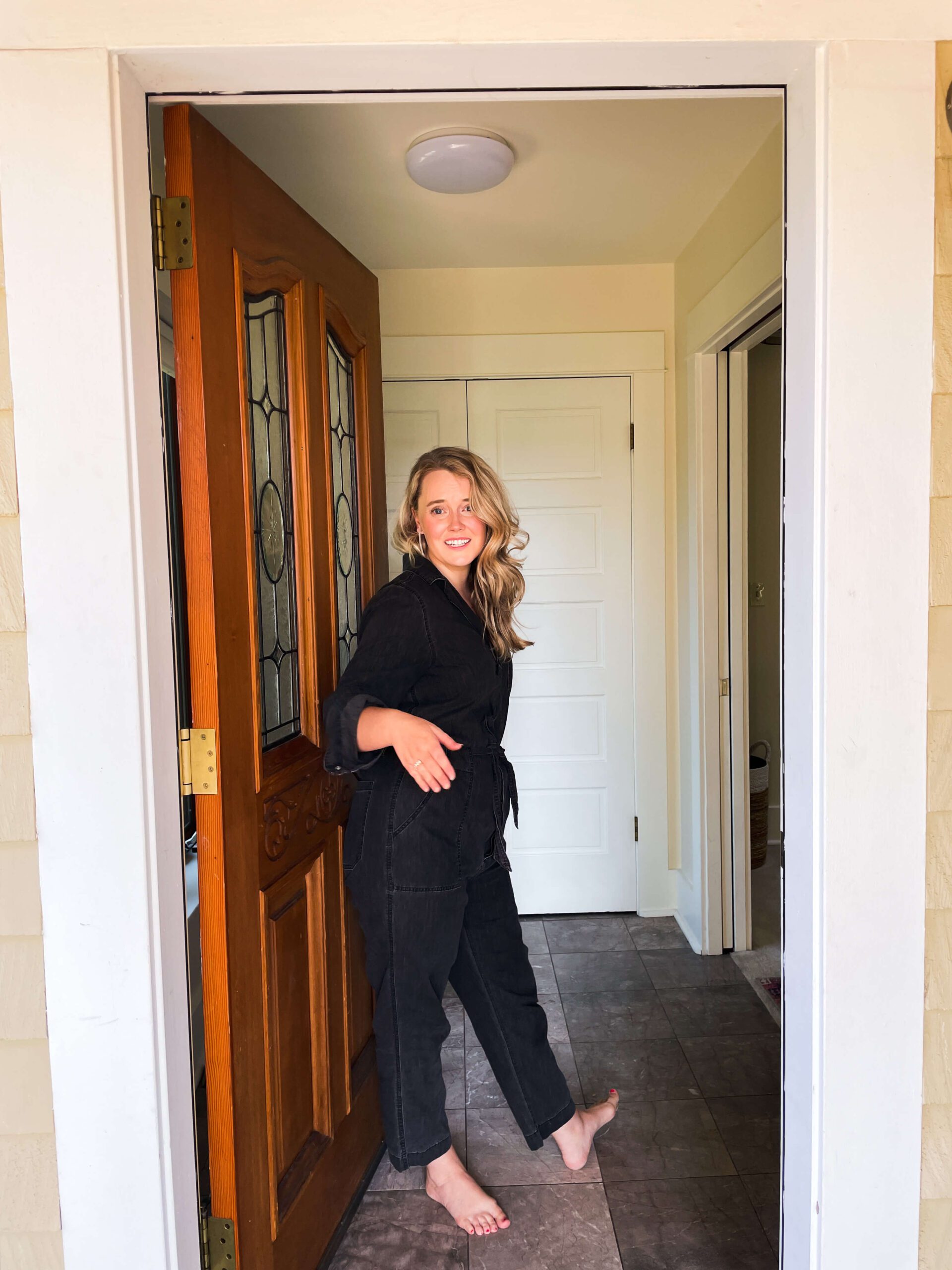
Acquaintances play a significant role in our social lives, serving as the initial step in forming friendships. However, there are other reasons that acquaintances are important: they provide familiarity in social settings we’d otherwise feel alone in, and they are the color in otherwise empty settings. They are potential connections, new opportunities, fresh perspectives, and social capital. The people that we might strike up a conversation with in line for a coffee and learn something new or simply have a pleasant interaction.
In this article, we will explore the concept of acquaintances, their role in our lives, and how relationships with acquaintances can grow and change over time.
What is an acquaintance relationship?
You come across acquaintances out in the world (or the virtual world)- whether it be at the gym, school events, work, community groups, through mutual friends, or networking groups.
Acquaintances are individuals you have a basic level of familiarity with, but you don’t necessarily seek them out first in a social setting. There may be a moment of uncertainty before greeting them, wondering if they remember you or what to talk about.
While you may engage in small talk with acquaintances at an event where you don’t know many people, spending the entire evening chatting with them might not feel entirely comfortable yet. The connection is one of the simplest we have, so it takes work to grow this relationship into a deeper connection.
Some Characteristics of acquaintances: limited interaction, specific context-based relationships, casual conversations
Examples of Acquaintances:
- Someone you meet at the bus stop every morning.
- A coworker from a different department whom you interact with only during all-hands meetings.
- A fellow gym member and acquaintance you rarely interact with but would recognize in other contexts.
- A friend’s college acquaintance whom you see only at their annual holiday party.
Why are acquaintances important?
It’s essential to recognize that our closest friends were once acquaintances. Acquaintances serve as the starting point for all our friendships, gradually transitioning into deeper connections. Here are a few reasons why acquaintances play a crucial role:
- Familiarity in New Settings: Acquaintances make new group settings feel more comfortable. Their presence, including acquaintance, provides a sense of familiarity, easing social interactions and helping us navigate unfamiliar environments.
- No-Pressure Social Interactions: Interacting with acquaintances allows for low-pressure social situations. Engaging in a quick chat provides an opportunity to connect briefly with an acquaintance before moving along, without the expectation of forming deeper connections immediately.
- Fresh Perspectives and Shared Interests: Acquaintances can bring fresh perspectives and shared interests into our lives. When we meet someone who shares a similar passion or interest, it adds excitement and makes conversations more engaging.
- Social Capital: Social capital is the value in our lives from our positive connections to people. Our relationships and reputation are assets that allow us more social mobility. Despite the numerous studies highlighting the significance of social capital, it often takes a back seat to efficiency and convenience in society. However, nurturing acquaintances can provide us with a network of support, opportunities, and resources that can greatly benefit us in various aspects of our lives.
- Social Support: In times of need, acquaintances can be a crucial support system. Their diverse experiences, perspectives, and skills create a wide network that can provide valuable assistance. This not only helps alleviate the burden on our closest friends but also ensures long-term care and support. Acquaintances can offer a unique perspective and help sustain primary caregivers for the long haul.
What are the benefits of a wide circle of acquaintances?
Having a wide circle of acquaintances can open up various opportunities. You can meet new people from different backgrounds, expanding your social network. This can lead to potential career advancements or collaborations.
- Enhanced social skills
- Exposure to diverse perspectives
- Increased chances for personal growth
A wide circle also provides a support system during challenging times. When you have numerous acquaintances, there are more individuals you can turn to for advice, help, or simply companionship.
- Access to different expertise
- Emotional support during tough situations
- Opportunities for learning and development
Building a Well-Rounded Social Network
The power in our social network isn’t in just one or two people; it is the cumulative impact of all the people in your life. By seeing the value in even our simplest relationships, we realize that we have many more people in our corner than we initially anticipated.
The beginnings of our social connections can be traced back to our families of origin, who take us out into the world where we partake in our first formal communities. In those communities, groups, and organizations, we meet acquaintances, and some eventually develop into friendships. Read about the Wheel of Connection to learn more.
All the people in our lives, including our acquaintances, have value in our lives.
Therefore, consider the following strategies to cultivate a well-rounded social circle:
- Seeking Supportive Communities: Join formal communities that support your interests and values. Join clubs, participate in volunteer work, or attend social events to meet individuals who share common passions and foster meaningful connections. Get out in your neighborhood, meet your neighbors, and stay open to simple connections.
- Developing Communication and Relationship Skills: Continue to invest in your friendship skills, and communication skills. We learn many things in our decades of school, but rarely do we learn much about making and maintaining connections past age 5. So, most of what we learn is through life experience, so take it easy on yourself as you navigate new situations.
Friendship is truly a journey worth savoring. Every friendship we have today began with a simple meeting and the gradual process of getting to know each other. So, when you come across someone new, embrace the opportunity to learn about them – because one day, you’ll look back on those initial moments with a sense of nostalgia and appreciation. Enjoy the journey of building connections and cherish the memories that come with it.
How Acquaintance Relationships Evolve and Transform
Shared Experience Roots
Most of your roots will stem from shared experiences or interests. These roots are formed by being in the same places, participating in similar activities, or bonding over common hobbies. You may interact with these acquaintances frequently, perhaps even more than some of your closest friends, but the relationship remains limited to these shared experiences. You don’t actively seek out contact with them; instead, you simply cross paths in places you both frequent.
Emotional Intimacy Roots
The majority of our acquaintance connections won’t have many emotional intimacy roots; however, that isn’t always the case. You are in control over what you pay attention to! If you see potential in this connection and want to befriend this person, you might pay closer attention. Sometimes, it’s easier to share with an acquaintance. Have a big goal? A scary one that you aren’t sure that your closest people will support? Sometimes, you might share that small intimacy with an acquaintance because you aren’t as concerned with their reaction.
Story Roots
There aren’t likely to be any story roots, but there might be in some rare circumstances.
How do you make acquaintances?
Get out in the world!
We encounter our acquaintances in various settings – whether it’s at the local coffee shop, grocery store, office, our children’s school, chess club, or book club. Additionally, actively participating in groups or attending events related to your interests can help you forge connections with new acquaintances who share your passion for a particular topic. You’ll also meet new acquaintances in community gatherings and active participation in any community you identify with, such as the military community, LGBTQIA+ community, BIPOC Community, and more. This presents an exciting opportunity to engage with like-minded individuals and expand your social circle.
Be Open to Connection and Approachable
When navigating through your daily life, try to be more open to simple interactions. If the idea of engaging with others fills you with dread, consider familiarizing yourself with The Liking Gap phenomenon. This psychological quirk tricks our brains into believing others don’t enjoy interacting with us despite studies showing the opposite.
Becoming more approachable doesn’t have to involve drastic changes. For instance, try leaving your headphones out for the first five blocks of your walk around the neighborhood. Once you’re further away, feel free to put them back in. This small gesture can signal to your neighbors that you’re open to a friendly greeting.
If you’re concerned about engaging in small talk, I’ve dedicated an entire episode to making these conversations more enjoyable. Remember, simple interactions can lead to meaningful connections and brighten someone’s day.
What is the difference between friends and acquaintances
Connection Depth
Acquaintances are people you know casually, with limited interaction and shared experiences. Friends, on the other hand, have a deeper bond formed through trust, emotional support, and more time spent together – check out my Roots Framework to finally have language to understand where to invest your energy to build these connections into something deeper.
Social Circles
We tend to have more acquaintances simply because it is easier to maintain this minimal level of connection. Our acquaintances are people that we see in places we go, so we aren’t making intentional plans to meet up with our acquaintances, so we pretty much always have the benefit of just seeing these people for the rest of our lives.
Acquaintances are often underestimated in our social circles, but there is value in these connections. Since we don’t have deep ties with them, we can enjoy casual conversations without feeling the pressure to follow up or overcommit constantly. It’s important to appreciate these relationships for what they are – light and easy connections that don’t require the same level of responsibility as our close friendships.
How to turn acquaintances into friends
Spend Quality Time Together
If you and this acquaintance both frequent a place or activity, you have built-in consistency – don’t squander it. Be consistent with your attendance. Make a point of striking up conversation beyond just small talk, or consider using small talk to your advantage. Learn how. to engage in a useful small talk here – explore common interests, values, and life experiences. Enjoy the experience of getting to know a new friend.
If you don’t frequently run into this acquaintance at your usual hangouts, try to find a regular way to connect. Consistency is key in building a strong connection, and meeting up at a shared favorite spot or joining a club or group together can be more relaxed than always having one-on-one gatherings. Spending time together is essential for nurturing this connection into something more than acquaintances.
Building Trust, but an Appropriate Pace
Keep things simple. If you try to overcomplicate your acquaintanceships by overpromising or oversharing, you might leave feeling guilty about how you now need to follow up but don’t want to. Instead, offer what you have to give in the moment.
For example, the acquaintance mentions they are looking for a new hairstylist. Offer the name of yours, look up the name of a friend-of-a-friends recommendation on the spot, or wish them luck on their hunt. Whatever you offer, do it in the moment. Don’t feel the need to walk away from the conversation with a follow-up task of “I need to find that name and text them later.” It’s OK to save that energy for those a little further along in your Wheel of Connection.
Basic Tips for Building Acquaintances into Friendships
- Say hello when you see them
- Exchange your usual chatter.
- Appreciate any conversations you enjoy having with each other.
- There is likely value hidden in those conversations even if is something as simple as a recommendation for a local restaurant or the green flag review of a local business.
- Appreciate the familiarity these people provide at places or functions where they are the only familiar faces.
Final Thoughts
While they may not be our closest companions, we can’t focus on what these interactions lack and instead should focus on what they do provide – familiarity and opportunity. Our acquaintances serve many roles in our lives, including social support, social capital, and an overall sense of belonging.
If you are someone who wants to make new friends, you can’t skip making acquaintances in the process, so be sure to consider the valuable roles these people play in your life, but also in your overall friend-making funnel.
Frequently Asked Questions
When do acquaintances become friends?
You will begin to transition from acquaintances to friends when you start to establish more connection points beyond your initial interactions. This means finding reasons to spend time together, share experiences, and reach out to each other. As you continue to build these connections, you will naturally progress towards a deeper friendship. By delving into the Roots of Friendship Framework, you can further understand the different types of friendships that may emerge. Starting off as a familiar friendship, intentional efforts to nurture the connection will pave the way for a more meaningful relationship to blossom.
Why do I only really have acquaintances?
Upon closer examination of the Wheel of Connection framework, you may find that individuals you label as acquaintances could actually fall into the categories of familiar friends or defined friends. It’s important to note that there’s nothing wrong with having a network primarily comprised of acquaintances and formal community connections if that suits your preferences. In fact, I recently discussed on my podcast an individual who thrives on a community-heavy wheel of connection. However, for most people, it’s beneficial to strike a balance between different types of connections. Take the time to cultivate relationships that align with your needs and preferences to create a well-rounded network.
What comes before acquaintances?
The beginnings of our social connections can be traced back to our families of origin, who take us out into the world where we partake in our first formal communities. In those communities, groups, and organizations, we meet acquaintances, and some eventually develop into friendships. Read about the Wheel of Connection to learn more.
What if someone is an “old acquaintance?”
We have many old acquaintances since we have more acquaintances overall in our social circles, but also because we are so closely connected that as we make life choices, changes, and pivots, we quickly lose touch with old acquaintances. You may come across individuals who were once part of your past, whether from a formal community, a familiar face from your past daily routine, or a member of a previous group or organization you belonged to. These individuals fall into the “old acquaintances,” which are past connections – people you may have shared experiences with but have since lost touch with. It’s common to struggle with finding common ground or topics to discuss with these individuals. Still, you once had a shared experience together, so learn about that as a topic of conversation. If this is a recurring challenge, consider tuning into the Friendship IRL Podcast for tips on navigating small talk.
When talking to acquaintances, what do I talk about?
Learn how to improve your small talk skills by tuning into episode 49 of the Friendship IRL Podcast. These tips will help you approach new acquaintances with genuine curiosity. Focus on discovering common interests and sharing small, personal details – I call these “small intimacies.” Don’t worry; they’re not as intimidating as they sound! Once you identify your own small intimacies, you’ll see that they’re actually low-risk ways to let someone into your life. Ultimately, stay curious and aim to establish a comfortable connection where both parties feel at ease conversing.







